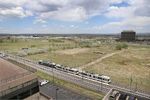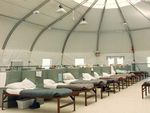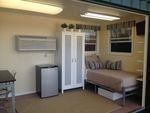FEDERAL CENTER STATION PROPERTY FAQ COLORADO COALITION FOR THE HOMELESS
←
→
Page content transcription
If your browser does not render page correctly, please read the page content below
FEDERAL CENTER STATION PROPERTY FAQ
COLORADO COALITION FOR THE HOMELESS
Updated February 1, 2018
WHAT IS THE FEDERAL CENTER STATION PROPERTY?
The Federal Center is a 59-acre property in Lakewood, Colorado, owned by the federal government and
managed by the General Services Administration (GSA) adjacent to the Federal Center RTD multi-modal
station. This property was declared surplus by GSA in 2016 and was initially deemed “unsuitable” for use to
assist the homeless by HUD in October 2016. The property was subsequently put up for public auction by GSA
in early 2017 for mixed use development including residential use.
Federal Center Station Surplus Property
Phase Two Development PlanWHY IS THE COLORADO COALITION INTERESTED IN THIS PROPERTY? Under Title V of the federal McKinney-Vento Homeless Assistance Act, excess or surplus federal property must be made available to homeless service providers at a nominal cost to assist the homeless. CCH has been working for more than 30 years to serve homeless families and individuals in Jefferson County, directly and in collaboration with other local human service agencies. The lack of available, affordable land in Lakewood and Jefferson County is a significant barrier to effectively responding to the increasing number of homeless families and individuals in Jefferson County. CCH believes this is an ideally located property that can significantly assist individuals and families experiencing homelessness in Jefferson County with housing, healthcare, employment and support services. WHAT IS TITLE V OF THE MCKINNEY-VENTO ACT? Title V of the McKinney-Vento Homeless Assistance Act of 1987, Public Law 101-645, enables eligible organizations to use unutilized, underutilized, excess, or surplus federal properties to assist persons experiencing homelessness. Eligible applicants are states, local governments, and nonprofit organizations. Properties, including land and buildings, are made available strictly on an "as-is" basis. No funding is available under Title V. Surplus properties may be transferred by lease or deed. Leases are provided free of charge for up to 20 years. Properties transferred by deed are restricted to continue to provide assistance to the homeless for a period of 30 years. Successful applicants may use the Title V properties to provide emergency shelter, services, transitional housing, permanent supportive housing, health care, employment services, storage, and other benefits to persons experiencing homelessness (HUD Exchange). WHAT LEGAL ACTIONS HAVE OCCURRED REGARDING THE FEDERAL CENTER PROPERTY? The Colorado Coalition for the Homeless filed a lawsuit and requested a Temporary Restraining Order (TRO) and Preliminary Injunction to prevent the imminent sale of a 59-acre, surplus portion of the Federal Center property in Lakewood, arguing that HUD’s determination that the property was unsuitable for homeless use, while General Services Administration (GSA) was marketing and selling the property as suitable for mixed-use
and market-rate residential development, was arbitrary and capricious and in violation of Title V of the McKinney-Vento Homeless Assistance Act and federal regulations. Judge Martinez issued a TRO prohibiting GSA from selling the property prior to August 11, 2017. In his Order, Judge Martinez found that CCH had demonstrated a “substantial likelihood of success on the merits” of proving that “HUD’s unsuitability determination was arbitrary and capricious and therefore in violation of the Administrative Procedures Act.” The Court further found that CCH would suffer irreparable injury if the GSA auction was permitted to conclude. Judge Martinez ordered GSA to refrain from accepting any offers or to “otherwise dispose of the Surplus Property before October 16, 2017”. HUD was given 30 days to reconsider its initial determination of unsuitability until September 14, 2017. HUD extended that deadline an additional 11 days before making its final decision. On September 25, 2017, HUD reversed the unsuitability determination regarding the Federal Center, determining that the property was indeed suitable for use to assist the homeless. HUD released a letter announcing its decision and GSA cancelled its auction and sale of the property. Eligible applicants were given the opportunity to submit a setter of interest to apply to acquire the property through lease or deed CCH filed its initial application with HHS requesting transfer of the property to CCH to provide emergency and transitional services for homeless families and individuals on the site on December 22nd and supplemented the application on January 12, 2018. On January 23rd, HHS approved CCH’s application. WHAT IS CCH PROPOSING TO DO AT THE FEDERAL CENTER PROPERTY? CCH is proposing a two-phase use and redevelopment of the Federal Center property. In Phase One CCH will use the property to provide a campus of emergency shelter and transitional housing and services for homeless families and individuals using temporary structures constructed or placed on the site by CCH. This will allow CCH and human service organizations in Jefferson County to meet the immediate emergency needs of homeless families and individuals in Jefferson County while completing planning for the second phase of development. In Phase Two, CCH will replace the temporary structures with newly constructed permanent buildings to be used for permanent supportive housing, permanent affordable housing, transitional supportive housing, and supportive services for homeless families and individuals. The area of the site between 4th Avenue and 6th Avenue will be used as a Solar Energy Collection Farm to provide electricity for the proposed uses during both phases and as a job training program for homeless individuals. WHAT TYPE OF STRUCTUES WILL BE USED DURING PHASE ONE? CCH will use a combination of manufactured housing, such as FEMA trailers, geodesic dome structures, and larger insulated tent structures to provide emergency and transitional housing for homeless families and individuals. Additional temporary structures will be used to provide support services, including counseling, employment and vocational services, and integrated health care services.
Phase One Site Map Dome Shelters
Manufactured Container Housing Typical Interior
Sprung Tent StructuresWILL THE SITE BE PRIORITIZED TO LAKEWOOD AND JEFFERSON COUNTY RESIDENTS?
CCH provides housing and services across the state of Colorado in collaboration with local human service
providers. CCH has been serving residents of Lakewood and Jefferson County for 30 year. Over the past five
years, CCH has provided housing and health care services to more than 1,800 individuals and family members
whose last permanent address was in Lakewood. CCH plans to provide priority to Lakewood and Jefferson
County residents to allow these persons to be served in their home community. This will lessen the demand on
services in Denver and surrounding communities.
WILL THE PROPERTY BE USED AS A TENT CITY?
CCH is not proposing to use the site as a “tent city”. We are proposing in Phase One to provide a number of
temporary structures to provide emergency shelter, transitional housing and support services for homeless
families and individuals. Only families and individuals enrolled in the program will be allowed to reside on-
site. Referrals for the program will come from local human service agencies and the OneHome coordinated
Intakc and Assessment system. The container housing structures will have individual bathrooms and showers.
There will be community bathrooms and showers for those residing in the emergency shelters. CCH is
committed to ensuring the safety and security of all program participants. Access to the site during phase one
will be limited by fencing and security personnel.
WHAT TYPE OF HOUSING WILL BE CONSTRUCTED DURING PHASE TWO?
CCH proposes to construct five apartment buildings on the site to provide up to 600 units of permanent and
transitional housing for families and individuals, with community spaces and social service offices on the first
levels. These four-story structures will be similar to apartment buildings constructed by CCH in other parts of
the Metro Denver area, including its most recently completed development at 40th and Colorado Blvd. in
Denver, the Renaissance at North Colorado Station. We have developed more than 1,800 units of housing in the
Metro Denver area over the past 20 years, including the Renaissance at Concord Plaza development at 17th and
Kendall in Lakewood. We pride ourselves in developing quality housing for formerly homeless families and
individuals that look and operate like market rate housing, and help revitalize communities.
Phase Two Proposed Plan for Area 1Renaissance at North Colorado Station, Completed 2016 WHO HAS DECISION MAKING AUTHORITY TO APPROVE THE PROPOSED USES FOR THE PROPERTY? Since the property is owned by the U.S. Government and considered a federal resource, the U.S. Department of Health and Human Services (HHS) has the sole authority to approve the application by CCH to use the property to assist the homeless in accordance with Title V of the McKinney Vento Homeless Assistance Act. While CCH has outreached to Lakewood and Jefferson County officials to provide details of its proposal, Lakewood and Jefferson County have no role in the decision to transfer the property to CCH. HHS approved the proposed uses detailed in CCH’s application on January 23, 2018. CCH will submit more detailed financing information on March 9, 2018. HHS will have 20 days to approve the financing plan. WHY ARE SERVICES FOR HOMELESS FAMILIES AND INDIVIDUALS BEING PROPOSED FOR THE PROPERTY? Through a combination of integrated healthcare, housing, employment, and support services, the Colorado Coalition for the Homeless provides lasting solutions to 18,000 individuals and families each year throughout the state. CCH has been providing housing and services to homeless and families in Jefferson County and throughout the Metro Denver area since 1986. As the housing market continues to become less affordable to low income families in every county in Colorado, and homelessness is increasing throughout Jefferson County and Metro Denver, the Coalition is more determined than ever to meet the immediate and long term needs of homeless families and individuals by creating supportive housing, and providing integrated health care, employment and social services for these families and individuals, including veterans. The data is striking in Jefferson County and is similar in surrounding Denver metro area: minimum wage does not afford decent housing. In the 2017 Out of Reach study by the National Low Income Housing Coalition, a person would need to work 85 hours per week at minimum wage to afford a 1-bedroom apartment in Jefferson County—more than double the traditional work week in the United States. The January 2017 Point-In-Time data found that there are 394 individuals and 244 families with children experiencing homelessness in Jefferson County alone. While this data only reflects those who participated in the survey on one day in January 2017 and who were within the HUD definition of homelessness, it shows there are many individuals without access to safe housing and support services. Point-In-Time data does not include:
those who are doubled/tripled up; families, youth and singles in hotels/motels paid for by themselves; hidden singles, youth and families; and those who refused the survey. We estimate that the number of persons experiencing homelessness during the course of the year is 2.5 times the Point in Time count. Thus, as many as 1,000 persons in Jefferson County experienced homelessness in 2017. Using this survey as a reference point, it is certain that there are many others in the community who were not counted but could significantly benefit from affordable housing and wrap-around services like healthcare, respite services, employment services, and case management. Indeed, the Colorado Department of Education estimates that there were 2,700 homeless students in the Jefferson County School District in 2017. The Colorado Coalition for the Homeless has proven for three decades that providing affordable and supportive housing and health care helps our communities provide safe environments for children to learn, for adults to recovery from substance abuse and receive medical treatment, and for many individuals who have experienced trauma to receive much needed behavioral and mental health services. Such housing and services also reduce the unnecessary taxpayer costs of emergency services, including police and courts, emergency room and hospital costs, detox, and similar costs. CCH believes the Federal Center Property provides a unique opportunity to create a new development to make Jefferson County a community where everyone has a safe place to call home and an opportunity to thrive. HOW MANY HOMELESS PERSONS WILL BE HOUSED AT THE PROPERTY? During Phase One, we will provide 250 emergency and transitional housing beds for homeless families and individuals. Residency will be limited to those who are referred to and enrolled into the program. During Phase Two, CCH will construct up to 600 apartments for formerly homeless families and individuals. Depending on the size of the families housed, the site could provide long term housing as many as 1,000 persons.
You can also read



























































